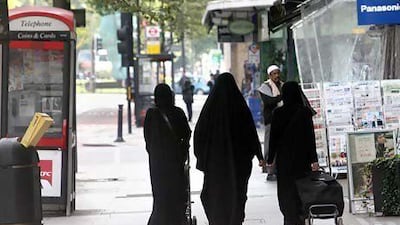Such is the grip my fellow Arabs appear to have on central London these days, two weeks in this most cosmopolitan of cities felt like I'd never left the Middle East.
Gone are the dark days of post-September 11 paranoia, when Arabs were personae non grata in Europe and were forced to find sanctuary in Rafiq Hariri's shiny new Beirut, a city where at least they knew they would be greeted with fawning and forelock tugging and anything was available at a price.
So while supporters of the United Kingdom Independent Party, or Ukip, may last week have voiced their resentment in local elections about the influx of foreigners threatening what they call the "English way of life", their anxiety was, I suspect, aimed more at hard-working Eastern Europeans who they claim are taking all the jobs, than the swarthy Ferrari-driving young men and the doe-eyed girls in open-top Mercedes who "own" the roads of Kensington and Chelsea.
Indeed, one only has to linger in half-decent hotels and department stores to catch a whiff of weapons-grade cologne and perfume, a constant reminder that Arab, along with Russian and Chinese, money is keeping this part of London afloat. All this does not bode well for a Beirut that went from the darling of Arab tourism to no-go zone in a few frenzied weeks last summer.
In Harvey Nichols or Selfridges, you might as well be in the souqs of Dubai or Beirut. Harrods is still the mother ship especially after the 2010 sale to Qatar Holdings for £1.5 billion (something of a steal given that revenues are now estimated at about £650 million) has added another layer of crowd-pleasing bling.
Lebanon was never far away, as I discovered during a lunch in Soho where I met a man whose company makes the most expensive beds in the world. I knew this because when I said I was Lebanese, he told me how three of his creations, with a combined value of £70,000 (Dh399,016) and destined for a Kuwaiti customer's Lebanese property, are still apparently languishing at the port of Beirut.
"Someone must have under-invoiced the shipment to pay less duty," he shrugged. "Beirut customs called me to check and I told them the truth. It's the agent's problem.
"That was four years ago - as far as I know they are still there. Either that or a Lebanese customs officer is having the best night's sleep of his life."
The man was Alistair Hughes and his company is Savoir Beds, bought by him from the Savoy Group in 1997. "I started with two and half men and a sewing machine," he laughed.
He now makes 600 units, with a turnover of £7m with 10 per cent of sales in the GCC. Mr Hughes hopes this number will grow and has just opened two showrooms in China and one in Qatar, where he is still working out how to encourage couples to "try" beds in a traditionally conservative region. "Maybe we can use a screen or something?," he said.
But if British goods are wowing the Arabs, Lebanese cuisine is still popular with the residents of South Kensington, who queue up patiently at lunchtime for a table at Comptoir Libanais.
Owned by the marathon-running, Algerian businessman Tony Kitous and styled by the Lebanese designer Rana Salam, the super-kitsch chain has taken Lebanese cuisine out of the dowdy Edgware Road formula and is proving a powerful platform.
But back in Beirut the entrepreneurial spirit for which we are famed has been crushed in the past year. Driving into town from the airport, I ask the driver about the mood in the city since I left. "All I want is a good summer with a lot of tourists so I can have a bit of money in my pocket."
Sadly, I think they may all be elsewhere.
Michael Karam is a Beirut-based freelance writer

